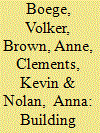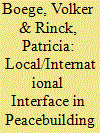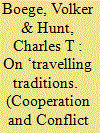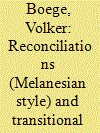|
|
|
Sort Order |
|
|
|
Items / Page
|
|
|
|
|
|
|
| Srl | Item |
| 1 |
ID:
091970


|
|
|
|
|
| Publication |
2009.
|
| Summary/Abstract |
Peacebuilding supports the emergence of stable political community in states and regions struggling with a legacy of violent conflict. This then raises the question of what political community might mean in the state in question. International peacebuilding operations have answered that question in terms of the promotion of conventional state-building along the lines of the Western Organization for Economic Cooperation and Development (OECD) model as the best path out of post-conflict state fragility and towards sustainable development and peace. This article argues for peacebuilding beyond notions of the liberal peace and constructions of the liberal state. Rather than thinking in terms of fragile states, it might be theoretically and practically more fruitful to think in terms of hybrid political orders, drawing on the resilience embedded in the communal life of societies within so-called fragile regions of the global South. This re-conceptualization opens new options for peacebuilding and for state formation as building political community.
|
|
|
|
|
|
|
|
|
|
|
|
|
|
|
|
| 2 |
ID:
170286


|
|
|
|
|
| Summary/Abstract |
In this article, internationally supported peacebuilding is conceptualized as a cross-cultural relational endeavour, with international and local actors engaged in multiple forms of interactions in a local everyday context. Using a cultural-relational approach, two cases of peacebuilding are presented: Bougainville and Sierra Leone, which are at opposite poles of the spectrum of international-local peacebuilding interaction. Peacebuilding on Bougainville has drawn relatively little attention; the international intervention there was modest and small in size, and locals had considerable control of the peace process. By contrast, Sierra Leone is one of the best-known cases of peacebuilding, with massive external engagement and comprehensive external control. Both cases are considered success stories, but they differ considerably due to the differences in local-international relations. This is explained by focusing on two interrelated core aspects of the local-international interface: building relationships and trust, and security provision. Furthermore, another generally underestimated dimension of peacebuilding is explored, namely culturally different understandings of the spiritual realm and their effects on peacebuilding interventions.
|
|
|
|
|
|
|
|
|
|
|
|
|
|
|
|
| 3 |
ID:
175363


|
|
|
|
|
| Summary/Abstract |
Important sources of everyday security – variously labelled as customary, informal, traditional or autochthonous – are commonly associated with rural spaces and attributed to the lack of presence or traction of state institutions. However, these practices are not limited to peripheries; they can travel. Their structures, authority and legitimacy can be re-produced in new settings, often in response to the perturbations caused by conflict, while also changing in the course of travel. Consequently, in urban spaces – the supposed ‘centre’ of the modern state – people’s sense of security can be profoundly influenced and shaped by the ordering logics of such ‘travelling traditions’. This has ramifications for ‘emplaced security’ – both short-term responses to acute vulnerability of displaced communities and emergent longer-term forms of order. This article explores the utility of the ‘spatial turn’ in peacebuilding theory for better understanding this phenomenon. It uses the cases of Vanuatu and Liberia to demonstrate how more nuanced understandings of the (re)construction of authority between and across places and scales may help comprehend how people generate everyday emplaced security. A spatial approach provides analytical leverage that can help to highlight how a phenomenon such as travelling traditions contributes to the formation and substance of emplaced security.
|
|
|
|
|
|
|
|
|
|
|
|
|
|
|
|
| 4 |
ID:
165122


|
|
|
|
|
| Summary/Abstract |
This article examines kastom reconciliations as practiced in a Melanesian cultural context in the resolution of everyday disputes and as a means of peacebuilding after large-scale violent conflict. It explores Melanesian-style reconciliation in relation to the conventional international discourse on transitional justice, asking whether kastom reconciliations are – or can be – an alternative to, or a specific ‘vernacularised’ form of, transitional justice. Using examples primarily from post-conflict Bougainville and Solomon Islands, the article addresses some of the strengths and limitations of kastom reconciliation in comparison to those of transitional justice. In conclusion it is posited that protagonists of transitional justice could gain insights from the study of Melanesian reconciliations that would help them to reflect on their own taken-for-granted assumptions and consider avenues for developing the concept of transitional justice, making it more meaningful, effective and legitimate in a context such as Melanesia.
|
|
|
|
|
|
|
|
|
|
|
|
|
|
|
|
|
|
|
|
|